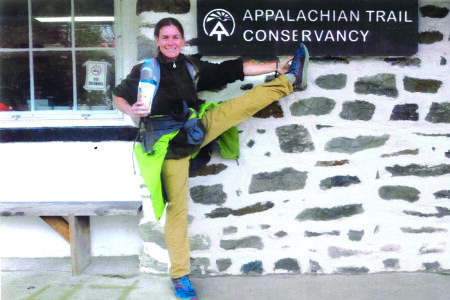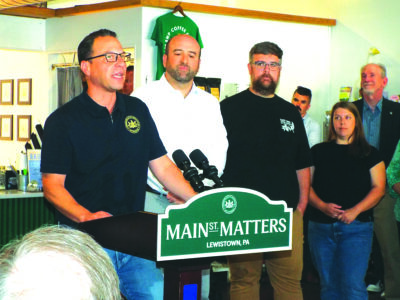The Earnest Family’s 100 years of firefighting service
A century on call
LEWISTOWN — The siren used to mean more than smoke and flame. In one Mifflin County family, it meant bloodlines, duty and the thrum of a century passing by–an unbroken chain of Earnests answering the call, night or day, through flood, fire or accident.
Leonard Earnest, now 75, stands at the tail end of a line that, by his count, stretches back a hundred years.
“It’s more than that now,” he says, voice as steady as an old engine. “From 1976 to now, that’s another 50 years since the Sentinel article about my family was written in 1975. So, it’s probably a hundred years altogether. I’m a lifetime member of the Junction. My cousin Eugene, who is 80, is a lifetime member of a couple of different fire companies. My cousin Sean, he’s 50, has been in the fire service since his teens.”
That’s three generations, at least–four if you count the fathers and grandfathers whose names turn up in faded articles and station rosters.
It started the way these things often do in small towns, where every second house is kin and the fire whistle carries across the fields.
“It’s something we got involved in when we were younger,” Leonard said. “Wasn’t a whole lot you could do. When the whistles kicked off, you’d wonder where they were going. After a time, we would join the fire company, jump on the truck or follow the truck and be there to help fight it.”
Fires were real, tangible things–worse than bills, bigger than school. “I remember when Clasters burned down out there on the Heights,” Leonard recalls, the memory crisp. “Joe Beers was the chief, and we were fighting it out whenever there were propane tanks blowing up inside.” He pauses, letting the scene speak for itself. “That’s a lot of years ago.”
Later, he mentions a home burning along Hawstone Road.
“It was down over the bank and we had a heck of a time getting to it.” There’s no nostalgia in his voice, only the simple weight of things seen and done.
The Earnests were always many. Leonard ticks off names and stations like a firehouse roll call: “Mark, Kenny’s son, he belongs to the Logan Fire Company. Mark would be fourth generation because our pap, then his dad, John and Kenny, and now Mark’s a firefighter. Mark’s two boys, well, one is a state policeman, and the other works for the Forest Service. Even Harold’s boy, the one who passed away, his boy, is in the fire service with the Junction.”
Cousins, husbands, brothers, wives–firefighting runs through marriages as well as blood. The job itself has changed.
“They have to go through a lot more training today,” Leonard said. “Back in the day, you got some training with getting the hoses out. Most of us didn’t even have an apparatus for breathing. We’d get there, have hats and coats on, and work on the fire.”
“Nowadays, they’ve got the breathing apparatus, oxygen tanks on their backs,” he continues. “Back then, you had a fire skull, but we had nothing like they have now. We’d go out and fight them. Chiefs told us what to do. We did it.”
A Fire Skull–more commonly known as a Skull Saver or Ladder Boot–is a heavy-duty padded cover that slips over the protruding end of a ground ladder on a fire truck. It’s designed to protect firefighters from accidental head injuries.
Pride is never far from the surface, but it’s understated. “I’m very proud of it, you know–of our family. We’ve given throughout the community, because I’m sure Kenny and they did a lot more to help save lives and protect people than I have. Well, I’ve moved around. I was with the fire company, like I said, for 25, 30 years.” Leonard doesn’t claim more than what he’s done. “Then I figured I was too old to fight fires anymore, so. And when the bar closed, I closed.”
His advice to a new firefighter is direct: “Just follow orders. Listen to whoever’s in charge and do as he tells you. That keeps you safe. You’re putting your life on the line when you go out and do this.”
For him, it was never about being a hero, only being there–again and again–when the bell rang, in the middle of the night or the edge of dawn.
If you look at the rosters now, you’ll still find Earnests. Leonard knows this.
“There was a crew of us,” he said, not with a boast but the knowledge of a man who’s seen a hundred fires and watched a century of family history play out in turnout gear. “If you check the fire company rosters, you’d find quite a few that are still with them.”
Time rolls forward, but the work stays the same. Ask Leonard why he keeps the old newspaper clipping–why it matters to tell the story again–and the answer is simple: “I was proud enough that I brought it out there (to the Sentinel) so that somebody would read it.”
For Leonard Earnest and his family, firefighting is less about adrenaline and more about belonging–a stubborn, lasting loyalty to place and people. The tools and trucks may change, but the job–showing up, standing firm, helping without expecting thanks–remains.
In Mifflin County, where the names on the trucks change little, that’s what it comes down to: a family who stands ready, generation after generation, to answer the call, no matter the hour, no matter the cost.


